Veteran applies military leadership skills to Health Sciences program
U.S. Marine Corps veteran Rudy Salcido uses the leadership skills he learned in combat to advance the Data Science Fellows Program and Soteria.
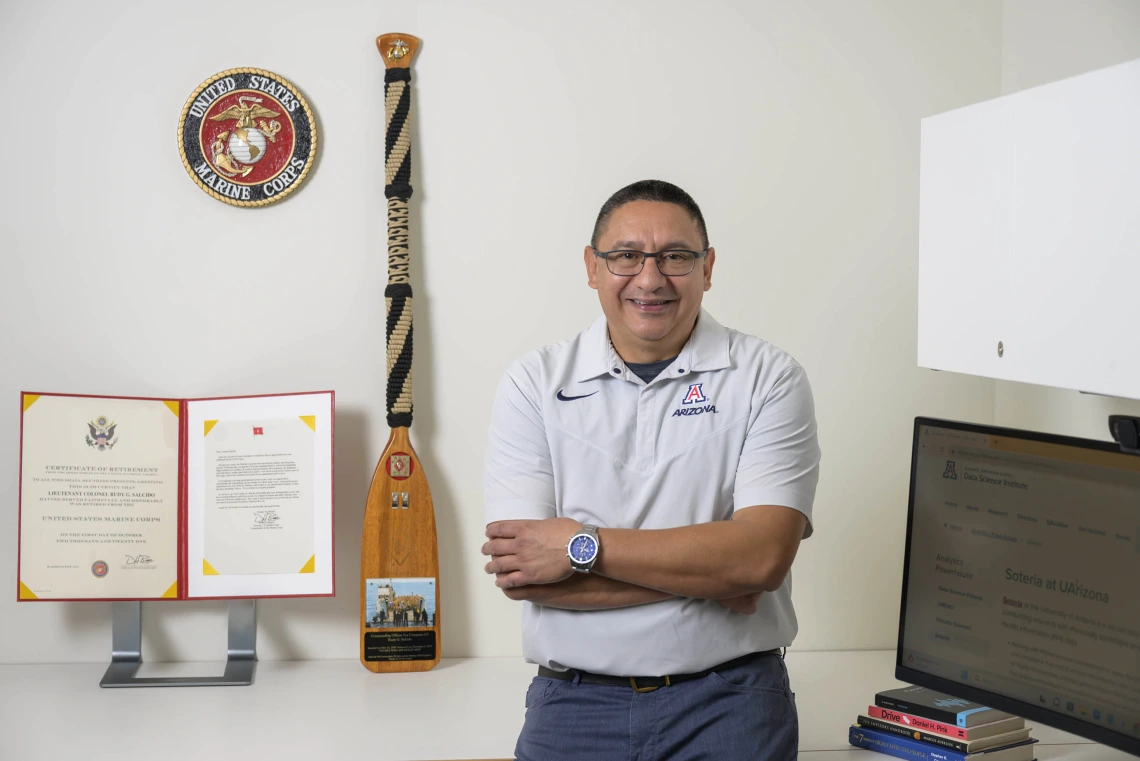
Before joining the University of Arizona, Rudy Salcido proudly served 28 years in the Marine Corps.
A battlefield may be the ultimate testing ground for leadership skills.
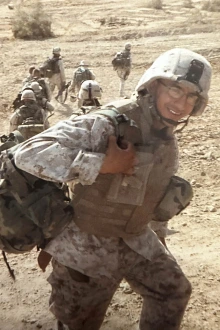
Rudy Salcido, MS, PMP, enlisted in the Marine Corps in 1992, right out of high school. He was first deployed to Iraq in 2003.
Courtesy of Rudy Salcido
“I needed to plan operations and make decisions that were literally life-and-death,” said Rudy Salcido, MS, PMP, who served two tours in Iraq as a Marine Corps Infantry Officer. “My father and his brother were both Korean War veterans. I had another uncle who was a Vietnam War veteran. Two of my brothers also went into the military. It is a bit of a family tradition.”
Salcido commanded a platoon of Marines during the invasion of Iraq in 2003 and was the second-in-charge of a company of more than 200 marines in his second deployment. His rank and responsibilities continued to grow throughout his career, including a combat tour in Afghanistan. After over 28 years of service, he retired as a lieutenant colonel.
Salcido’s experience in critical thinking, problem solving and leading cross-functional teams prepared him well for a career in the civilian world. He is now a program manager for the University of Arizona Health Sciences strategic initiative Health Analytics Powerhouse, which funds the Data Science Fellows Program and Soteria, a secure data and analysis enclave that allows researchers to use data containing protected health information.
Taking charge and problem framing
The Data Science Fellows Program sits at the intersection of cutting-edge data science techniques and scientific research. Each semester, up to six fellows receive training on foundational open science skills and computational infrastructure. The first focuses on the reproducibility of science, and the second provides the ability to automate processes in data science research.
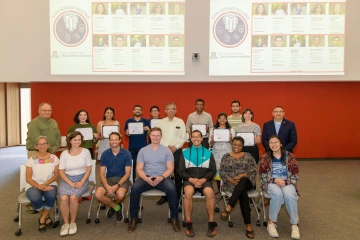
Director Nirav Merchant (standing in the center), Rudy Salcido (far right) and Carlos Lizarraga (far left) help train up to six Data Science Fellows each semester. They are pictured with the Spring 2023 cohort.
The goal is for fellows to apply advanced data science tools and methodologies to their research and teach others to do the same while elevating knowledge and collaboration within the UArizona Health Sciences research community.
Many nonscientists might have been intimidated by the subject matter, but Salcido says he trusted the management and leadership skills he learned and tested in the military.
“A leader doesn’t need to be an expert in everything their people are doing, they just need to learn what their people need so they can do their jobs effectively,” he said. “For instance, I don’t know how to fly a fighter jet, but I needed to plan operations that involved aircraft. So, I sat down with pilots and involved them in the planning process. I’m not an expert in data science, but I sat down with our director, Nirav Merchant, and our educators to find out what they needed.”
When Salcido came onboard in October 2022, one of his first actions was to go through a process he learned in the Marine Corps and calls “problem framing.” Because the Data Science Fellows Program was formed at the outset of the COVID-19 pandemic, there were a certain number of challenges in some of the programs’ processes and organization.
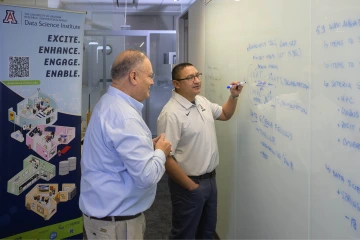
Carlos Lizarraga, PhD, provides advising and training for the Data Science Fellows. He worked with Salcido to draw up plans for the program.
“You don’t want to fight an enemy without understanding the enemy first, so, I pulled all our educators into a room, and we methodically went through pressure points for them,” Salcido said. “I tried to understand where they were seeing shortfalls and in what areas problems could arise. We also went over our mission and found tasks that needed to be accomplished.”
The team identified several opportunities that weren’t possible during the pandemic, including inviting guest speakers for events and preparing resources for in-person workshops.
Making space for people to thrive
One of Salcido’s first priorities was to make sure everything about the upcoming spring semester was mapped out before it began and organize Soteria efforts. This included details that seemed small, but had a big effect, said Data Science Institute computation and data science educator Carlos Lizarraga, PhD.
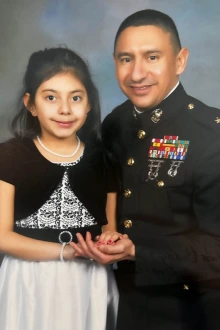
Salcido’s military retirement was driven by his daughter, Sariah, who would have had to change high schools due to relocations. He considers it an honor and a blessing to pursue his second career at the University of Arizona.
Courtesy of Rudy Salcido
“My workshops are geared toward PhD students who are working on a dissertation, and they already have data they need to analyze. Depending on the type of data they have and the problem they are trying to solve, they need to use some different methods and tools for analysis and extracting information from the data,” Lizarraga said. “Rudy’s planning really allows me the time and ability to concentrate on what my students need. I don’t have to worry about a room reservation or if there is a projector or if the guest speaker knows where to park. Everything has been planned out ahead of time.”
Salcido says this type of planning creates space for people to thrive.
“You can’t maximize your effectiveness if you are just going day-to-day. That puts you in a reactionary state of mind. When I got here, we were meeting our obligations, but people were fighting today for tomorrow. I wanted us to be fighting for at least a few months on the horizon,” he said. “I think planning for the future is one of the best things a leader can do for the success of an organization. It reduces the friction your people might have while doing their jobs, increases momentum and allows more space to build on successes.”
For Lizarraga, Salcido’s unique approach was a welcome change of pace.
“Salcido brings a different mindset and a different dynamic to the academic community. He is very precise and detailed, and that structured approach has proven to be very valuable,” Lizarraga said. “He is also very good at motivating people and has really helped bring us together as a team.”
Salcido is happy his skills are valued in a university setting and says as a veteran, he is honored and humbled to be part of a new mission.
“I'm a firm believer in what the Data Science Fellows Program is accomplishing, and I am inspired by the education being provided. These students are all unique, and they are applying data science to fascinating projects that could really help the world,” Salcido said. “For me to be a facilitator of that brings me a lot of joy.”
Experts
Rudy Salcido, MS, PMP
Research Program Administration Manager, D7: AZ Data Science Initiative
Program Manager, Data Science Fellows Program and Soteria
Nirav Merchant, MS
Director, Cyber Innovation
Director, Data Science Institute
Interim Director, Biomedical Informatics and Biostatistics Center
Co-Principle Investigator, CyVerse
Member, BIO5 Institute
Carlos Lizarraga, PhD
Educator, Computation and Data Science, D7: AZ Data Science Initiative
Contact
Brian Brennan
Office of Communications, University of Arizona Health Sciences
520-621-3510, brianbrennan@arizona.edu

